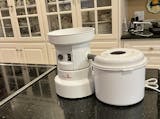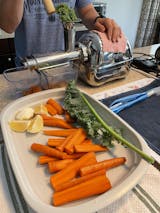There are so many types of juicers on the market these days that it is difficult to know where to start when sourcing your own juicer. Here, we look at the different types of juicers and give some indication as to what they are, what the pros and cons are and also a comparison between the juicers.
What types of juicers are there?
Selecting your preferred juicer ultimately depends on what you need as your end product. Do you want a juicer that works at a very fast speed so that you can extract juice quickly and conveniently? Or are you looking for slow juicers that offer a higher nutritional value?
There are 5 main types of juicers on the market, each with their own unique characteristics, pros and cons. These are centrifugal juicers, masticating juicers, manual juicers, twin gear or triturating juicers and steam juicers.
Centrifugal juicers
Centrifugal juicers work using a very high speed blade, which shreds the flesh of the fruit or vegetable into a pulp. The centrifugal juicer then spins at a high speed, using centrifugal force to push the juice through a mesh and into a separate chamber.
Pros of centrifugal juicers
A centrifugal juicer is one of the most suited solutions for those on a budget or with little experience of using juice pressers. It is also a very straightforward machine to operate, with the entire operation of making juice consisting of placing the fruit and vegetables into the machine and switching it on!
If you're in a hurry, then a centrifugal juicer is perfect. It's a very fast juicer, much faster than a masticating juicer, with the juice extracted quickly and efficiently.
A centrifugal juicer is also compact, it can be stored away if necessary and does not take up much room on your kitchen counter.
Cons of centrifugal juicers
The fast processing speed of a centrifugal juicer is also part of its negative aspect. The juice quality is degraded somewhat by the high levels of oxidation, meaning that the finished juice can be frothy and can separate quite quickly unless consumed straight away.
Additionally, this means that the juice won't stay fresh for very long, so you can't really make it in batches and store it in the fridge. Certain ingredients such as leafy greens are also not easily processable in this type of machine.
Masticating juicers
Masticating juicers are also known as a slow juicer, predominantly due to the fact that juice is extracted at a slow speed. A masticating juicer uses slow rotations of an auger to masticate the juice, which then slowly squeezes the fruit or vegetable, separating the pulp from the juice.
Pros of masticating juicers
Perhaps the most prominent benefit of masticating juicers is that they produce a high quality juice, with a high density of nutrients. The slow release process ensures that there is less oxidation and therefore the juice is less likely to split after a short time. The juice yield is also much higher - the juice is thicker and fresher for longer.
Masticating juicers are also highly cost effective, often outlasting other models and the higher juice yield of up to 20% means that more is squeezed from your raw materials. Additionally, it is more efficient to handle leafy greens such as kale and spinach, which can prove difficult in other machines. It's also a much quieter machine than other types of juicers.
Cons of masticating juicers
Although masticating juicers can be seen as cost effective, they are often priced at a higher level than other types of juicer. If you're looking for machines that produce high quality juice then this may not be a factor, but it is definitely worth considering.
Masticating juicers work at a much slower rate than other juicers. Not only do the raw ingredients need to be chopped smaller initially because the machines can only handle small pieces at a time, but the mastication process also takes time. This is fine if you have lots of time, but if you're looking for a juice on the go, then this type of juicer may not be for you.
Horizontal masticating juicers in particular can take up a lot of counter space and therefore are not as easy to store when not in use.
Manual juicers
Some form of manual juicer is found in most domestic kitchens. There are however adapted manual juicers which make the juicing process more efficient. There are generally 3 types of manual juicers; hand press juicers, hand crank juicers and a hydraulic press juicer. Hand press juicers are perhaps the most traditional form, using a manual press to extract juice.
Hand crank juicer models use a handle, which is manually turned to create force which generates an extracted juice. Finally, hydraulic press juicers use hydraulic pressure to squeeze juice from the pulp of fruit or vegetables, using manual force.
Pros of manual juicers
Perhaps the most obvious benefit of a manual juicer is that they are in general less expensive than electric juicers. They are also portable and don't have the same noise levels of electric juicers, which is perfect for domestic environments. Similar to a masticating juicer, the slow juice press produces a high quality finished juice, full of nutrients and with low oxidation.
The lack of requirement for electricity or housing machinery means that a manual juice press is highly portable; they can be transported to any place and can be stored easily.
Cons of manual juicers
The fact that manual juicers require manual input means that they can be quite slow in extracting juice. If you're looking to make large quantities, then a manual juicer may not be for you.
Additionally, manual juicers can be limited in the fruit and vegetables that they can process. They are not, for example, suited to juicing leafy greens.
Twin Gear (or Triturating) Juicers
A triturating juicer provides perhaps some of the most efficient juice extraction of all the types of juicers available. As the name suggests, twin gear juicers use two augurs that rotate to grind up the raw materials. This creates the perfect environment for juice extraction.
Pros of Twin Gear juicers
The efficiency of the twin gears from a twin gear juicer, provides a highly nutritional output, with minimal aeration and oxidation. There is also less waste, as the juicer extracts the absolute maximum it can from the raw ingredients.
The low oxidation rate also means that a twin gear juicer produces perhaps the finest quality juice that lasts a long time and does not separate. The twin gear action creates a versatile machine that can produce a number of different end products such as nut butter and even pasta!
Cons of Twin Gear juicers
As triturating juicers produce a high quality output, they are inevitably among the most expensive types of juicer on the market. In a similar way to masticating juicers, they are also slow to produce juice in high quantities.
Finally, they can be extremely bulky and difficult to clean. Storage in a domestic kitchen can prove problematic.
Steam juicers
As the name suggests, steam juicers use the power of steam to extract juice from fruit and vegetable pulp. A hot water pool creates hot vapour, which breaks down the fruit or vegetable and thus releases the juices held within. The juice then travels down a hose and is collected.
Pros of steam juicers
Steam juicers are particularly adept at extracting juice from juicy fruits such as berries. This enables the juicer to produce juice that can be used for jams and jellies in particular. They are also fairly inexpensive in comparison to other juicers.
Cons of steam juicers
The high temperatures used in a steam juicer can mean that many of the nutrients can be lost in the process. As they are quite a specialist form of juicer, there is not a huge range of options on the market or available outlets.
What type of juicer should I buy?
As with any purchase, the type of juicer you decide to buy is an entirely personal decision. If you're looking for a quick and easy drink that you are likely to consume straight away, then a centrifugal juicer is ideal. However, if the nutritional value and quality of the juice is more important to you, then a masticating or twin gear juicer would be your juicer of choice.
You'll also want to consider the quantities of juice that you intend to make. Some juicers are more suited to creating larger quantities but you may need to offset that with less quality.
For a simpler solution, you may even consider a manual juicer to use a more traditional method of extracting juice by hand. Ultimately, the decision comes down to your budget, your individual needs and quite often the space and storage area that you have.
Whichever type of juicer you choose, Extreme Wellness Supply has a range of all the above juicers to choose from, so that you can see for yourself what is available on the market.



















